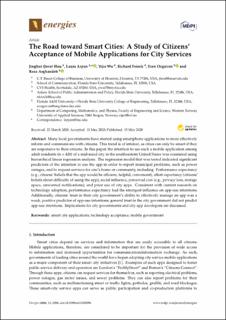| dc.contributor.author | Hou, Jinghui (Jove) | |
| dc.contributor.author | Arpan, Laura | |
| dc.contributor.author | Wu, Yijie | |
| dc.contributor.author | Feiock, Richard | |
| dc.contributor.author | Ozguven, Eren Erman | |
| dc.contributor.author | Arghandeh, Reza | |
| dc.coverage.spatial | USA | en_US |
| dc.date.accessioned | 2020-08-10T11:05:55Z | |
| dc.date.available | 2020-08-10T11:05:55Z | |
| dc.date.created | 2020-05-19T13:08:25Z | |
| dc.date.issued | 2020 | |
| dc.identifier.citation | Hou, J., Arpan, L., Wu, Y., Feiock, R., Ozguven, E. & Arghandeh, R. (2020). The road toward smart cities: A study of citizens’ acceptance of mobile applications for city services. Energies, 13(10). | en_US |
| dc.identifier.issn | 1996-1073 | |
| dc.identifier.uri | https://hdl.handle.net/11250/2671344 | |
| dc.description.abstract | Many local governments have started using smartphone applications to more effectively inform and communicate with citizens. This trend is of interest, as cities can only be smart if they are responsive to their citizens. In this paper, the intention to use such a mobile application among adult residents (n = 420) of a mid-sized city in the southeastern United States was examined using hierarchical linear regression analysis. The regression model that was tested indicated significant predictors of the intention to use the app in order to report municipal problems, such as power outages, and to request services for one’s home or community, including: Performance expectancy (e.g., citizens’ beliefs that the app would be efficient, helpful, convenient), effort expectancy (citizens’ beliefs about difficulty of using the app), social influence, perceived cost (e.g., privacy loss, storage space, unwanted notifications), and prior use of city apps. Consistent with current research on technology adoption, performance expectancy had the strongest influence on app-use intentions. Additionally, citizens’ trust in their city government’s ability to effectively manage an app was a weak, positive predictor of app-use intentions; general trust in the city government did not predict app-use intentions. Implications for city governments and city app developers are discussed. | en_US |
| dc.language.iso | eng | en_US |
| dc.publisher | MDPI | en_US |
| dc.rights | Navngivelse 4.0 Internasjonal | * |
| dc.rights.uri | http://creativecommons.org/licenses/by/4.0/deed.no | * |
| dc.subject | smart city applications | en_US |
| dc.subject | technology acceptance | en_US |
| dc.subject | mobile government | en_US |
| dc.title | The Road toward Smart Cities: A Study of Citizens’ Acceptance of Mobile Applications for City Services | en_US |
| dc.type | Peer reviewed | en_US |
| dc.type | Journal article | en_US |
| dc.description.version | publishedVersion | en_US |
| dc.rights.holder | © 2020 by the authors | en_US |
| dc.source.volume | 13 | en_US |
| dc.source.journal | Energies | en_US |
| dc.source.issue | 10 | en_US |
| dc.identifier.doi | https://doi.org/10.3390/en13102496 | |
| dc.identifier.cristin | 1811692 | |
| cristin.ispublished | true | |
| cristin.fulltext | original | |
| cristin.qualitycode | 1 | |

